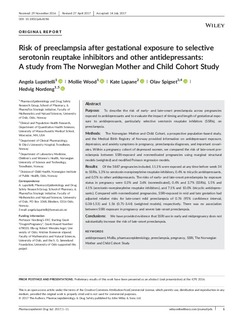Risk of preeclampsia after gestational exposure to selective serotonin reuptake inhibitors and other antidepressants: A study from The Norwegian Mother and Child Cohort Study
Journal article, Peer reviewed
Published version
Permanent lenke
http://hdl.handle.net/11250/2451903Utgivelsesdato
2017Metadata
Vis full innførselSamlinger
Sammendrag
Purpose
To describe the risk of early- and late-onset preeclampsia across pregnancies exposed to antidepressants and to evaluate the impact of timing and length of gestational exposure to antidepressants, particularly selective serotonin reuptake inhibitors (SSRIs), on preeclampsia.
Methods
The Norwegian Mother and Child Cohort, a prospective population-based study, and the Medical Birth Registry of Norway provided information on antidepressant exposure, depression, and anxiety symptoms in pregnancy, preeclampsia diagnoses, and important covariates. Within a pregnancy cohort of depressed women, we compared the risk of late-onset preeclampsia between SSRI-exposed and nonmedicated pregnancies using marginal structural models (weighted) and modified Poisson regression models.
Results
Of the 5887 pregnancies included, 11.1% were exposed at any time before week 34 to SSRIs, 1.3% to serotonin-norepinephrine reuptake inhibitors, 0.4% to tricyclic antidepressants, and 0.5% to other antidepressants. The risks of early- and late-onset preeclampsia by exposure status in pregnancy were 0.3% and 3.6% (nonmedicated), 0.4% and 3.7% (SSRIs), 1.5% and 4.1% (serotonin-norepinephrine reuptake inhibitors), and 7.1% and 10.0% (tricyclic antidepressants). Compared with nonmedicated pregnancies, SSRI-exposed in mid and late gestation had adjusted relative risks for late-onset mild preeclampsia of 0.76 (95% confidence interval, 0.38-1.53) and 1.56 (0.71-3.44) (weighted models), respectively. There was no association between SSRI exposure in pregnancy and severe late-onset preeclampsia.
Conclusions
We have provided evidence that SSRI use in early and midpregnancy does not substantially increase the risk of late-onset preeclampsia.

